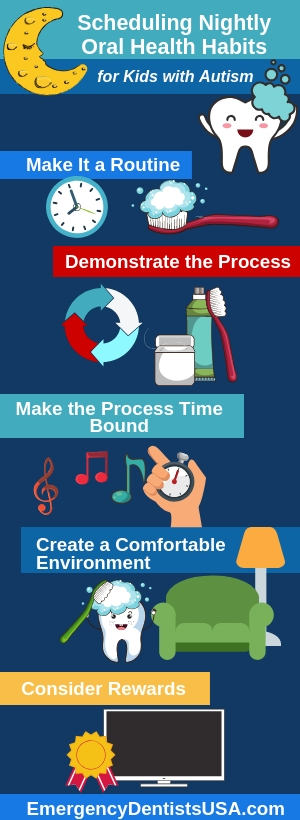Helping Thousands of People Each Year Find Dental Services
- Emergency dental surgery, cavities, general dental care.
- Find immediate help, no insurance required.
- Get relief from chipped, cracked or lost teeth, abscesses or toothaches.
Scheduling Nightly Oral Health Habits for Kids with Autism
Dr. Greg Grillo DDS
As a dentist, one of the things I say over and over is to make sure you have good habits at home. This is especially important to instill in children; and where I get a lot of questions is from parents with autistic children. They understand the importance of a nightly oral routine, but struggle with getting their child to commit to it. To help, I’ve put together some quick tips that should hopefully get your child brush each and every night, and help get them accustomed to the new activity.
Make It a Routine
First off, make your child’s oral care a daily routine. There are many individuals with autism who benefit from having a set schedule, so make sure dental care is an expected part of their routine. This also helps them understand that is a daily and necessary task; the end goal should be accepting that they must brush every night.
Demonstrate the Process
A good way to introduce the process is to show your child first how you do it. This includes both brushing and flossing. I find it helpful to not only show the child, but also explain how each part of the process is cleaning the teeth. For example, explain how you need to make sure that they get both the front and back of the tooth. If your child is receptive to it, you can also gently demonstrate the process by brushing/flossing their teeth the first couple of times.
Make the Process Time Bound
A great way to keep the child engaged in the process is to have some sort of audio/visual timer that shows progress. This also helps avoid unclear endings, instead of saying “you’re almost done” they can simply see the timer (or hear the music) and know how much longer there is.
There are many ways to accomplish this. Some people just use a simple stop watch or analog timer. For a more sophisticated solution, there are toothbrushes that play songs to match the time allotted for brushing. The key here is to find what works best for your child. In some cases, a music playing toothbrush could be too much for certain children, while a loud timer going off might be a problem for others.
Create a Comfortable Environment
While most people will brush in the bathroom, when you first start it might be easier to use an already comfortable location. Many parents have reported success with starting on the couch, in the bath, or similar, and then gradually moving into the bathroom once the routine has been mastered. This can help encourage them at first and give them a sense of control during the start of a new activity.
Consider Rewards
Another very popular method is to have some sort of incentive or reward. This could be a physical reward, or just praise for a job well done. For example, a week’s worth of brushing with no problems might earn the child an extra 15 minutes of television.
Once again, this is going to be reliant how child responds to rewards. Some will and some won’t, while for some only certain rewards will prompt the desired behavior.
Good Nightly Oral Habits
I can’t stress enough how important it is for any child to practice good nightly oral habits. The goal is to make it almost second nature, and an accepted part of your nightly routine. It can take some time to get into it, but it will prevent many problems down the road and help your child lead a healthier life. It can be tricky to start with an autistic child but is well worth the effort!
If you’re left with any questions don’t hesitate to contact your dentist. They want what’s best for your child and can provide further assistance in helping them on the road to good oral health.





